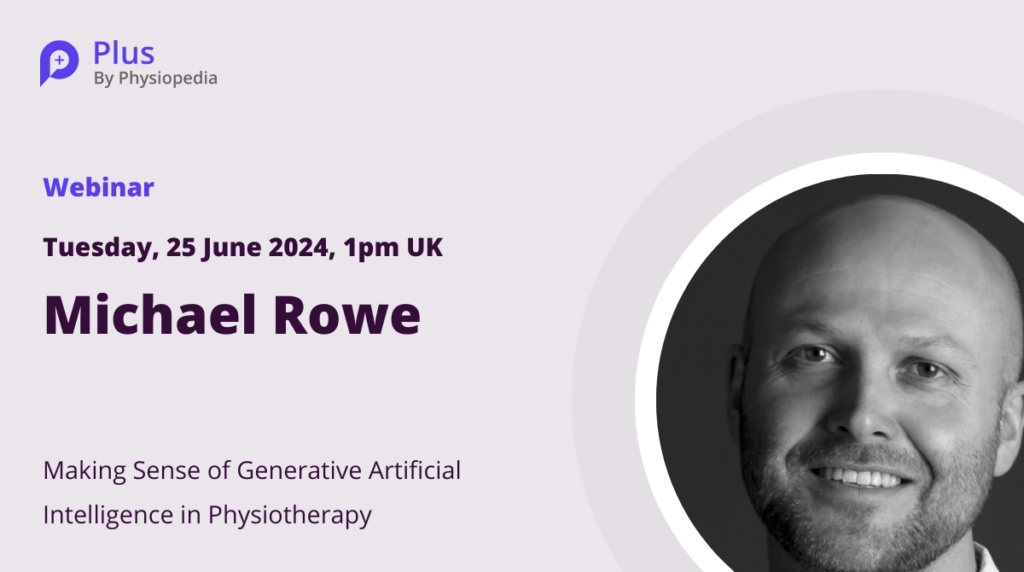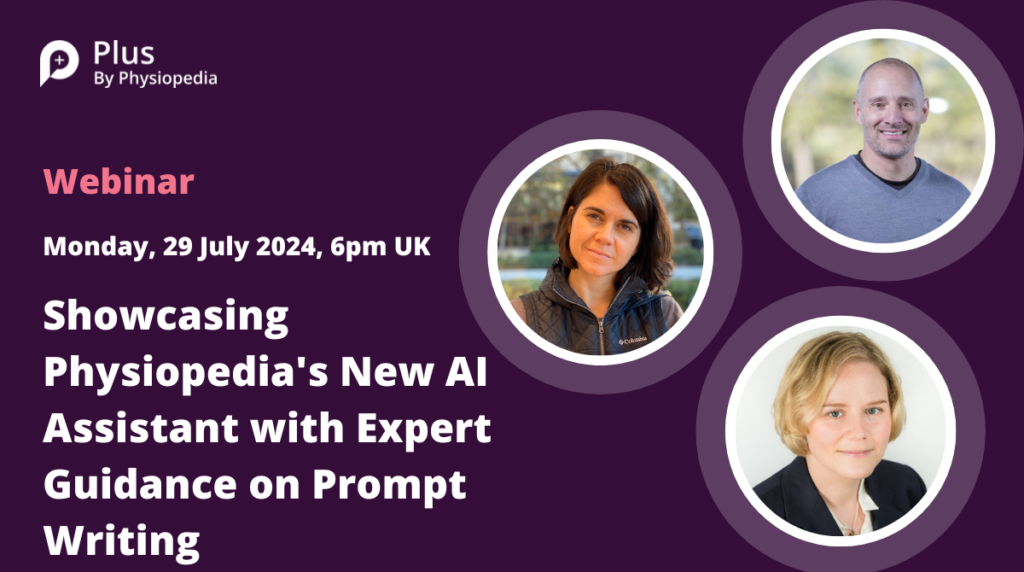Whether you like the idea or not, artificial intelligence (AI) is fast becoming ingrained in physiotherapy practice and by getting on board we can harness the power of AI to our collective advantage. Here are some key points you need to understand as we rocket towards the next era of physiotherapy practice.
It has been said that only 2% of Brits use artificial intelligence (AI), and 6 in 10 US adults say they would feel uncomfortable if their healthcare provider relied on AI. So you’d be forgiven for thinking that you don’t need to get on board with the use of AI in healthcare. But the reality is that AI is not a fad, it is here to stay and it will influence all of our lives whether we realise it or not within the next couple of years.
AI is not going to replace humans, humans with AI will replace humans that don’t use AI – Emad Mostaque
With that in mind, here are our FAQs on AI in general and also on our brand new Physiopedia AI Assistant. This is the Physiopedia guide to what you need to know, and why you should be excited – not fearful – about this new era of Physiotherapy.
I’ve never heard of generative AI, what is it?
AI is the science of enabling computers and machines to think like humans – to simulate human intelligence and problem-solving capabilities, with the advantage of being able to process large amounts of data at speed. Whilst predictive AI tools operate on predefined rules and are useful for analysing patterns to make forecasts, generative AI can now actually create new content and ideas.
What exactly can generative AI do?
Using the well known Chat GPT as an example, generative AI can be used as a chatbot that uses your questions (prompts) to respond in a way that mimics conversation; it can also compose essays, have philosophical conversations and do maths, among many other things. With generative AI, you get out what you put in – quality answers come from having a quality data source as well as quality of prompts inputted.
Why is this relevant to me as a rehabilitation professional?
Whilst every industry will be impacted by AI there is little doubt that generative AI will change the jobs of healthcare professionals forever. Indeed the first NHS physiotherapy clinic run by AI has recently been announced in the UK, as well as the launch of our very own Physiopedia AI Assistant – and this is just the very beginning. Whether we like it or not, AI will change the way we practise physiotherapy in the very near future. And your first step might just be using our Physiopedia AI Assistant in your clinical practice.
What is the Physiopedia AI Assistant?
This is your personal AI-powered rehabilitation assistant uniquely designed by Physiopedia. It’s an AI chat tool (like ChatGPT) but specifically for rehabilitation professionals – trained on the internationally respected Physiopedia content database, which is constantly being refined and updated with the latest evidence. Ask questions like you would to a mentor or peer and it will look for the answer based on Physiopedia resources. Physiopedia is the source of all answers provided by the Physiopedia AI Assistant, allowing us to monitor the quality of the data being used to help you.
How do I use the Physiopedia AI Assistant?
It is available for all Physiopedia Plus (Plus) Full and Pro Members. Trial members also have 1 week to play with it for free. Click on the button displayed on the bottom right of any page when you are logged into Plus to get started. The more detail you give in your prompts, the better the answers will be (and you can learn how to optimise your prompt writing in our upcoming webinar on the topic). You can also refer to the Plus Help page on the topic for further information.
I hear that it makes mistakes, how can I trust it?
AI should do the hard work and humans be responsible for the facts
We all make mistakes, and we are all learning, and that is the same for AI. It is always a good idea to check important information against the articles on Physiopedia and their original sources, so you can make sure you are happy with any information before you use it – just as you would do when doing research yourself.
AI is all about spam, scams and deep fakes, I don’t want to be involved
The availability of generative AI has certainly fueled free and low-cost applications that require little technical skill to create deepfakes (videos or audio clips that make it appear as though someone is saying or doing something they never did) and scams. Whilst we should all consider ways to protect ourselves against online scams and deepfakes, it would be a misunderstanding to use this as a reason to avoid all AI tools, which have the huge potential to improve our clinical practice.
It’s going to replace me, I don’t like it
Whilst generative AI tools such as the Physiopedia AI Assistant show enormous promise, they are still learning, and do not have the human touch. This is not a tool designed to replace you, rather to support your decision making and improve your efficiency and effectiveness as a clinician. Think of the Physiopedia AI Assistant as just that – your assistant. Combine the answers with your clinical judgement and use it to check facts quickly and get ideas for those tricky patients.
Google Search is fine for me, why would I use this?
The era of searching Google for anything and everything has certainly changed healthcare, and an internet search will continue to be a useful tool. But the Physiopedia AI Assistant differs in that it pulls information specifically from Physiopedia and can engage in conversation; the ability to ask follow-up questions for clarification and to refine the response lets you dive in more deeply to get just what you need. This is not possible with a general internet search.
I use ChatGPT already, why would I pay for the Physiopedia AI Assistant?
We love ChatGPT, in fact it inspired the Physiopedia AI Assistant. But it is not specific for rehabilitation professionals, and you can’t guarantee the sources it uses will be evidence based. That’s what the Physiopedia AI Assistant was created for. So you know you are getting information from a trusted resource that has been created by rehabilitation professionals, for rehabilitation professionals. We have included the AI Assistant as part of our Plus member benefits and think you are going to love it.
This is not the time to be cautious, this is a time to jump on board and ride the wave. It’s going to be bumpy but we must get involved now in how AI is shaping the future of rehabilitation. We must ensure that our professional practice is valued and enhanced, not made obsolete. But remember, whilst generative AI has the potential to revolutionise health and personalise patient treatment, ultimately the essence of providing healthcare will continue to revolve around empathy, compassion and the human touch. Generative AI technology creates the opportunity to augment these qualities in ways that will support healthcare professionals in their essential role in society.
Those who are able to embrace this technology will find they are able to use their skills and training to improve patient lives in ever more rewarding ways, and we can’t wait to continue this journey with you.
Physiopedia Plus is a subscription site that offers internationally accredited continuing education and professional development opportunities for the global rehabilitation community in 6 languages.
Your subscription fees fund the Physiopedia charity website to keep it updated and openly accessible to all.
Your subscription also provides FREE access to Plus for rehabilitation professionals in low income countries.
There are also discounts available depending on where you live and for students.

